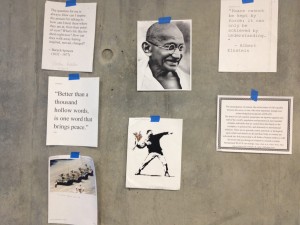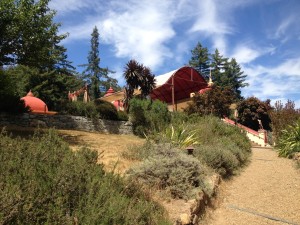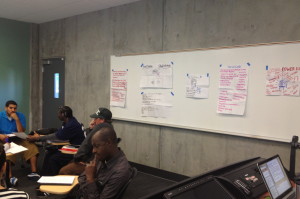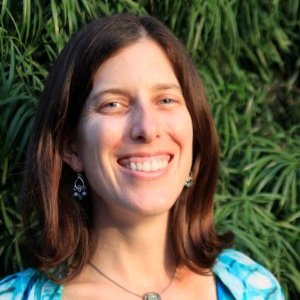Guest post by peace educator Katie Zanoni
“By education I mean an all-round drawing out of the best in the child and man – body, mind and spirit.”
–Mahatma Gandhi
This summer I received a unique opportunity to attend the first annual Metta Center for Nonviolence restorative retreat entitled, the Power of Renewal. Among the other participants, I was able to use this time to reflect upon my work as a peace educator and my aspirations of expanding my knowledge education on nonviolence. During one of our group sessions together our astute teacher, Michael Nagler, inquired, “Do you know what the meaning is behind the word education”? We collectively shook our head no. Dr. Nagler shared that the word education essentially means to bring out what is inside of you.
As I drifted back into the business of my world after the conclusion of the retreat, I decided to sit with this idea of what education or to educate truly means. During the retreat I realized, that I had never fully considered what the true definition was behind this word educate that embodies what I believe describes my true essence and captures my ultimate hopes of realizing a more peaceful world. In looking up the word, there are a few different definitions available. To educate stems from a Latin origin and means “to lead forth” or as another source defines, “to bring out”.
To lead forth.
To bring out.
As a peace educator, the meaning of this word would be naturally interpreted to mean that my role is to lead forth the true knowledge my students possess within their own hearts, souls, and minds. To bring out the collective knowledge and wisdom of the entire learning community as we engage in theories related to the content covered in my Peace Studies courses. I found this to be true last semester in my course on Nonviolence and Conflict Resolution. While the course was taught with the intention to provide a core foundation of theories and applications of nonviolence as a form of constructive conflict resolution, I believe the most profound learning experience occurred when we applied the concept of nonviolence to the students’ personal lives.
In lieu of a mid-term exam, students were invited to apply the knowledge they had gained thus far to a personal interview with someone whom they believed lived a nonviolent lifestyle. The interviewee could have been a role model, a practitioner of nonviolence, a leading academic in the field, or a personal acquaintance that embodied the essence of what nonviolence meant to the student. Prior to conducting the interview, each student was requested to write up a short biography of the interviewee and offer a rationale as to why the person selected lived a nonviolent lifestyle.
As I read through the biographical sketches of the individuals the students chose, I realized how fortunate I was to uncover this concealed secret: nonviolence is all around us. It appears many of us have become accustomed to having a heightened awareness of the violence in our world and unfortunately that has overshadowed inspiring acts of kindness, mindfulness, and right intention that occur each day in our communities.
The students’ reflection papers reaffirmed my realization and I sat reading each paper in deep appreciation for the time and dedication our learning community took to complete this assignment. Each person took great care in selecting a practitioner of nonviolence and reported back that the interview facilitated a thought provoking and honest dialogue. Students were offered a platform to consider what nonviolence meant to the person they interviewed and related these ideas back to their own views on nonviolence. One of the core learning objectives of the course is for students to, “assess one’s beliefs and positions regarding the practice of nonviolence as a strategy of conflict resolution”. This assignment fulfilled this learning objective by allowing the students to apply these theories to someone in their community and determine how consciously living a nonviolent lifestyle can positively impact one’s wellbeing.
Perhaps my favorite part of this assignment was when all of the students shared the insights from their interviews with the entire learning community in short presentations. As we sat in a circle the students recounted story after story and it quickly became apparent that a nonviolent world is not only possible; it is presently all around us. As one student reflected, “…after conducting this interview…I found that the principles of nonviolence that we have learned about in class are being utilized constantly in the world around me by the people closest to me.” Stories of people who rose above a violent past were voiced, accounts of people who struggled nonviolently through protest and methods of persuasion were heard, and life histories from families raised in nonviolent homes were offered throughout the class periods.
Our learning community transcended the traditional boundaries of education and brought out the true nature and ability of nonviolence that is within each and every one of us. This was a powerful realization for me to arrive to as an educator. Working with the students to uncover these unique stories of nonviolent individuals reaffirmed my belief that as educators we ought to consistently seek out opportunities to draw out the collective wisdom that our students possess. As one student stated, “This project, along with this enlightening, essential class has reinforced my soul that you always have a choice on how you want to confront things and that it starts within ourselves to make a change.”
Katie Zanoni is a peace educator who co-developed the first Peace Studies Associate Degree in California at San Diego City College and has taught in the program since 2008. In the fall of 2013, she will recommit herself to the classroom not as a professor, but as a student to pursue a doctorate in International and Multicultural Education at the University of San Francisco. Please contact Katie to discuss curriculum development related to peace studies, human rights, nonviolence, women and children in peacebuilding, and sustainability. Katiezanoni@gmail.com













” A nonviolent world is not only possible; it is presently all around us.”A wonderful and inspiring message! Thank you Katie for giving us this positive initiation! …An example is,see how the world responded Malala,the young peace activist, who stands for the cause of educational rights of women.This girl has lighted the candle of a new awakening. I find here a theology, which shows how GOD acts for His children in different times through different people. Stand fro a culture of peace and not for a culture of death!